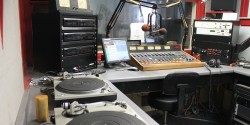Most people assume that college radio is by definition non-commercial, but that hasn’t always been the case historically and commercial college radio stations still exist today. Back in the early days of AM radio in the 1920s, the very first college radio stations were commercial endeavors. Fast-forward to the 1940s, when the growth of campus-only carrier current radio stations led to the birth of the Intercollegiate Broadcasting System (IBS). IBS was very involved with working with both stations and advertisers in order to secure advertising deals to support college radio efforts.
In Gas Pipe Networks: A History of College Radio 1936-1946, Louis Bloch writes about the early days of IBS and its work to attract advertisers for its member stations in the 1940s. Bloch states, “Business for college radio was good and the advertising agencies welcomed me as I made contacts.” Some of the early advertisers on campus-only carrier current stations included The Standard Oil Company of New Jersey, Beechnut, Biltmore Hotel, Readers Digest, R.J. Reynolds Tobacco Company, as well as local jewelry stores and record shops.
By the 1940s, the FCC was at work developing a plan for educational FM channels. In its 2011 report on “The Changing Media Landscape in a Broadband Era,” the FCC states, “Since the 1930s, Congressional and FCC policies have mandated that spectrum be set aside for noncommercial use. The FCC first began reserving spectrum for noncommercial educational (NCE) radio broadcast use in 1938, selecting channels in the 41–42 MHz band before moving the reserved band to 88–92 MHz in 1945. In radio, the FCC continues to reserve the lowest 20 channels on the FM broadcast band for NCE use, as well as channel 200 (87.9 MHz) for class-D NCE stations. The FCC has never reserved any AM channels for noncommercial use.”
As FM grew more popular in the 1940s and 1950s, more and more college radio stations applied for FCC licenses and often transitioned their unlicensed carrier current stations to licensed non-commercial FM stations. However, some college radio stations opted to apply for commercial radio licenses instead. It’s interesting to note that many of commercial college radio stations on the FM dial in 2015 are long-time stations, several of which were descended from early carrier current stations. Additionally, many of these stations are also run by non-profit organizations that are independent from the universities that house the related college radio stations.
The first commercial college radio station that I visited was WPGU-FM at University of Illinois, Urbana-Champaign, which is owned by the non-profit Illini Media Company. Last year I also visited Harvard’s commercial radio station WHRB-FM, which is also owned by a non-profit led by station alumni. Other commercial college radio stations include Princeton’s not-for-profit commercial radio station WPRB-FM (read more about the station’s history) in New Jersey, Brown’s WBRU-FM, owned by the Brown Broadcasting Service in Providence, Rhode Island, Cornell’s WVBR-FM, which is run by an independent non-profit in Ithaca New York, University of Virginia’s WUVA-FM, and Howard University’s WHUR-FM, which is professionally-run and offers mentorships to student DJs at Howard’s online and HD student-run station WHBC (read about my recent visit).
Although FM commercial college radio stations are few and far between, the world of online radio is still the wild west, where stations can choose to be commercial, non-commercial, for-profit, or non-profit. Although college radio started out as a largely commercial form of media early in the 20th century, it’s become far more associated with an independent, non-commercial ethos in recent years. If you are aware of other commercially licensed college radio stations, drop us a note.
The piece originally appeared in the June 25, 2015 Radio Survivor Bulletin. Subscribe to our free, weekly Radio Survivor Bulletin here.
We cover the culture of college radio every Friday in our College Radio Watch feature. If you have college radio news to share, please drop us a note at EDITORS at RADIOSURVIVOR dot COM.



